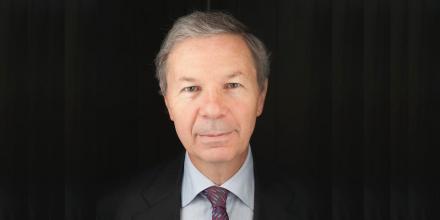 Greetings from the Australian National University in Canberra, where Jean-Marie Guéhenno, President of the International Crisis Group is speaking on "Reconfiguring the international response to rising security threats". Guéhenno was introduced by his predecessor as President of the International Crisis Group, Gareth Evans, now Chancellor of the ANU.
Greetings from the Australian National University in Canberra, where Jean-Marie Guéhenno, President of the International Crisis Group is speaking on "Reconfiguring the international response to rising security threats". Guéhenno was introduced by his predecessor as President of the International Crisis Group, Gareth Evans, now Chancellor of the ANU.Guéhenno began by characterizing the Russian intervention in Ukraine and rise of the Islamic State terrorist group as black-swan events. By this he meant they were events no one expected (but should have). He described the diffusion of power after the end of the cold war. He also mentioned the information connectivity of the world, with news of one death in Europe being reported world wide.
I was not convinced by Guéhenno's thesis. For more than one hundred years, since the invention so he electric telegraph, we have had global communications. The cold war had the USA and USSR restraining their client states to some extent, but there were still conflicts in places such as Afghanistan, Est Asia and the Middle East.
Terrorist/Liberation movements franchising their operations is not a new phenomenon, nor is the influence of non-state actors in conflict.
Guéhenno's argument that institution-building in transitional countries (which I assume is the new term for developing nations) is a good idea. However, I do not share his concern about parents sending their children to a Madrasa. A Madrasa is simply the Arabic word for a school, usually one associated with Islam. Secular schools and schools of any religion can teach rigid dogma and intolerance, or not.
Perhaps the problem is that Western powers have forgotten that one rule still applies in international relations: the Golden Rule: Those who have the gold make the rules.The Western countries have less funding to spend on military and other interventions, as a result have less global influence.
It is possible to use soft power, through aid and provision of education, but this still costs money. Western democratic governments have gone down a path of promising their citizens peace and prosperity at no cost, which is unachievable.
Australia current has advanced fighter jets attacking ISIS. A more cost effective approach may be to conduct an on-line information campaign and provide low cost education, particularly for teachers and other professionals, with e-Madrasa.
Guéhenno argues that compromise and diplomacy is required, balancing principles with realism. He used the example of calls for removal of the current Syrian government helped with the rise of ISIS.
Guéhenno's argument that institution-building in transitional countries (which I assume is the new term for developing nations) is a good idea. However, I do not share his concern about parents sending their children to a Madrasa. A Madrasa is simply the Arabic word for a school, usually one associated with Islam. Secular schools and schools of any religion can teach rigid dogma and intolerance, or not.
Perhaps the problem is that Western powers have forgotten that one rule still applies in international relations: the Golden Rule: Those who have the gold make the rules.The Western countries have less funding to spend on military and other interventions, as a result have less global influence.
It is possible to use soft power, through aid and provision of education, but this still costs money. Western democratic governments have gone down a path of promising their citizens peace and prosperity at no cost, which is unachievable.
Australia current has advanced fighter jets attacking ISIS. A more cost effective approach may be to conduct an on-line information campaign and provide low cost education, particularly for teachers and other professionals, with e-Madrasa.
Guéhenno argues that compromise and diplomacy is required, balancing principles with realism. He used the example of calls for removal of the current Syrian government helped with the rise of ISIS.
Guéhenno argued for building of resilient societies. However, this can be undermined by the short term need for politicians to stay in power. An example of this is a recent statement by the Australian Prime Minister, Tony Abbot: "It’s clear to me, that for too long, we have given those who might be a threat to our country the benefit of the doubt." (A message from the Prime Minister, 15 February 2015).
Asked what would be the hot-spots in 2015, Guéhenno nominated Central Asia.
Asked about terror as a weapon, Guéhenno commented it might be better to have a degree in psychology, than political science.
Asked what would be the hot-spots in 2015, Guéhenno nominated Central Asia.
Asked about terror as a weapon, Guéhenno commented it might be better to have a degree in psychology, than political science.
Responding to international security threats
"Increasing geopolitical competition is amplifying international conflict and diminishing the global community’s ability to respond to rising distributed threats like extremism and post-authoritarian chaos. The international community needs to get back to basics: supporting the long, hard slog of institution-building in transitional countries; addressing the social and political problems that provide the fertiliser for radical movements; and recognising that we are unlikely to solve conflicts if we only talk to people who agree with us."
No comments:
Post a Comment